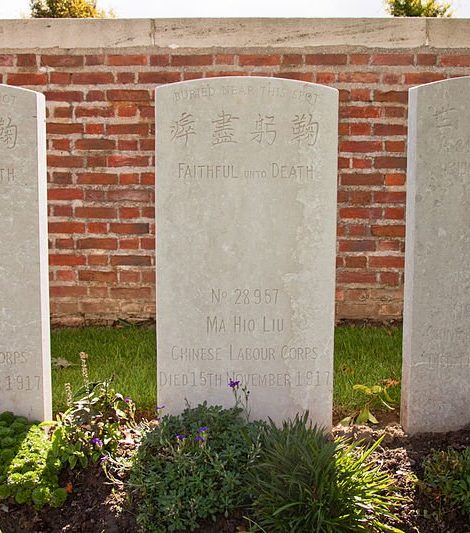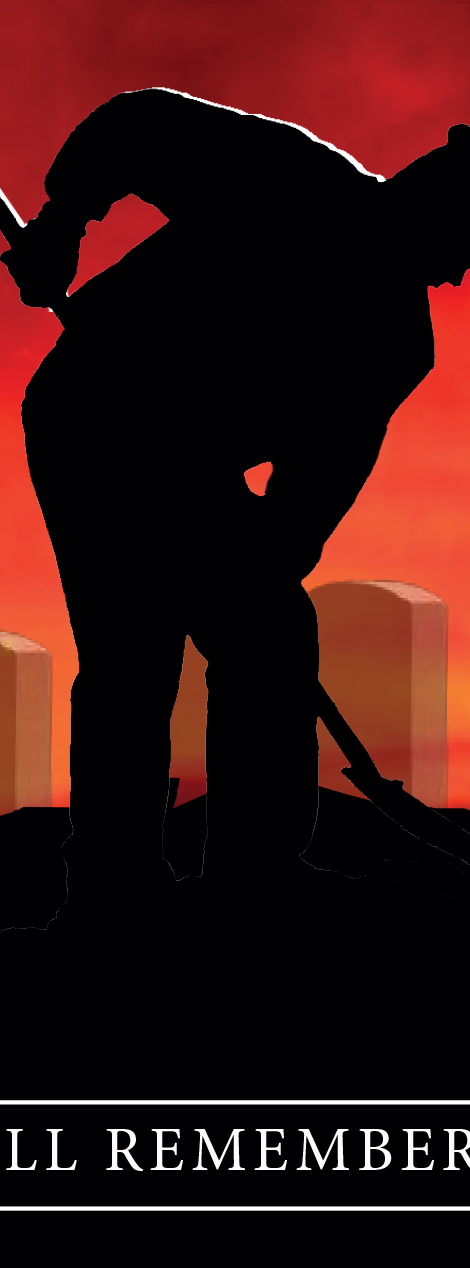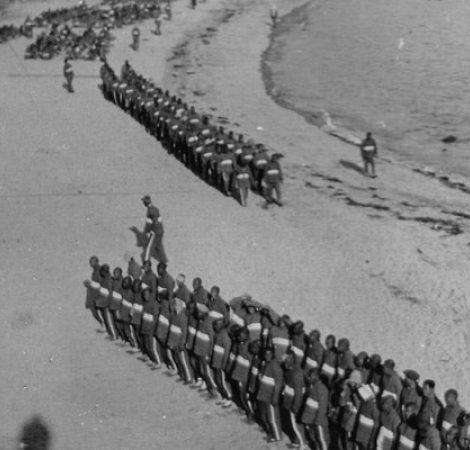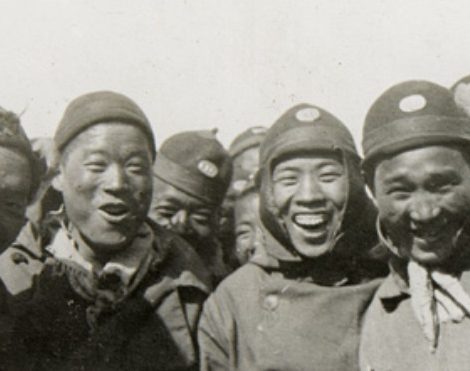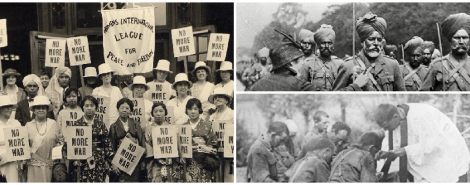Organised by The Meridian Society and The British Library Date: Saturday, 17th November 2018 Time: 1.00-4.30pm Venue: Knowledge Centre, British Library, 96 Euston Road, London NW1 2DB On 11th November 1918, streets throughout Western Europe were filled with jubilant crowds. Armistice had been declared and weary soldiers were able at last to go home. Yet, …
Category Archives: History
An armistice day message from Steve Lau, founder and Chair of the ensuring We Remember Campaign
One hundred years ago today the fighting in Europe stopped and the guns fell silent. Like people the world over, the Chinese celebrated the arrival of peace: a three day national holiday was announced in China. As the sounds of the last gunfire faded, it is hard to imagine what thoughts ran through the minds …
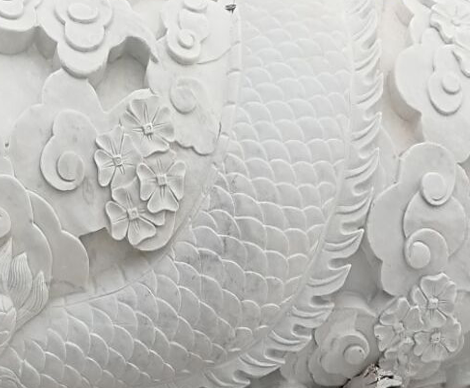
A short note on numbers and who we will commemorate on the Memorial Huabiao
The number of 96,000 is, as best we can estimate, the correct number of Chinese recruited into the Chinese Labour Corps. It is a number we have agreed with Dr Gregory James, the world’s foremost authority on the Chinese Labour Corps. The figure of 140,000 is sometimes used. This figure is the approximate figure (perhaps …
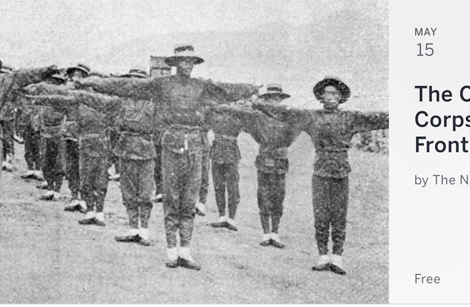
Talk at the National Archives: The Chinese Labour Corps on the Western Front
Steve Lau, Chair of the Ensuring We Remember campaign, will talk about Chinese peasants who were sent to the Western Front during the First World War. Learn about the journey of the Chinese Labour Corps, as they were secretly transported across Canada, and shipped to Europe to fight in a war they didn’t necessarily understand. …
Cambrai and the Chinese Contribution
The centenary of the Battle of Cambrai has just passed. We have produced an infographic on Cambrai and the Chinese Contribution. CLC Cambrai Infographic download
Presentation: Propaganda and Shifted Reality
A presentation by Steve Lau, Chair of the Ensuring We Remember Campaign, at the launch event of, The Stories behind the Pictures: Colonial Troops in the First World War. This event is being held at University of Hull, HU6 7RX Friday, 20th October. An outline of the presentation follows. By the outbreak of the First …
Review: Chinese Labour Corps Photographs from the WJ Hawkings Collection.
The following is an independent review of the publication Chinese Labour Corps Photographs from the W J Hawkings Collection. The review is by Dr John R A Cleaver, Life Fellow and College Archivist, Fitzwilliam College, Cambridge. Our thanks to Dr Cleaver for making this contribution. This new book is an annotated collection of photographs from William James …
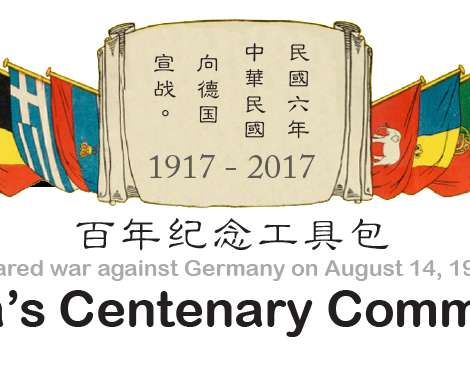
Chinese Centenary Commemoration Toolkit
The Ensuring We Remember Campaign if spearheaded by a coalition of major UK Chinese non-profit organisations. To mark today’s centennial anniversary of China declaring war on Germany we reflect on the position of the Chinese community in the UK, whilst launching our Centenary Commemorations Toolkit. Today the Chinese community holds a privileged position in the …
“War as seen by the Chinese”
The following articles appeared in the South China Morning Post on November 9th, 1918. WAR AS SEEN BY THE CHINESE AN INTERPRETER IN THE LABOUR CORPS Mr Chow Chen-fu, Interpreter to the 167th Chinese Labour Co., Labour Corps, B.E.F., France, writes to a foreign friend in Shanghai: You ask me to give you a description …
The Chinese Labour Corps and why they matter.
A response to The Yorkshire Post’s, Story behind the First World War Cemetries and why they matter. That so respected an academic can detail the establishment of First World War cemeteries in such detail and not mention the harrowing contribution of the Chinese Labour Corps is testament to just how effectively their story has been …
Video: Robbed of Reason
To mark Mental Health Awareness Week we are launching our latest video, Robbed of Reason. When 96,000 Chinese volunteered to work for the British army on the First World War’s Western Front they almost certainly had no idea what they had let themselves in for. The Chinese Labour Corps were all but forgotten after the war, despite two …
A prophetic view of a future war with Japan
It was a Chinese official at Peking who first gave me the sense that China is unconquerable and conquering. I had gone to this official to ask certain questions concerning political affairs, he had listened quietly and answered with seeming frankness. He had no illusions concerning the present situation. The Chinese Government was weak; its …
President Woodrow Wilson describes “profound sympathy for China”.
You have heard a great deal- something that was true and a great deal that was false-about that provision of the treaty which hands over to Japan the rights which Germany enjoyed in the Province of Shantung in China. In the first place, Germany did not enjoy any rights there that other nations had not …
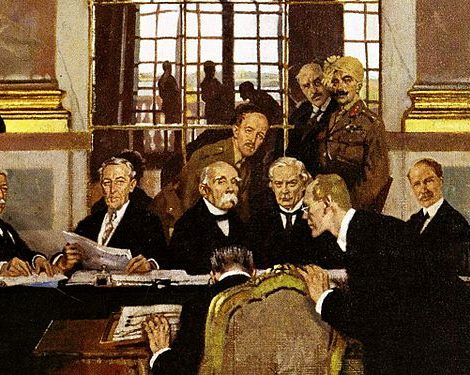
Commenting on the Betrayal in Paris
So much for self-determination! I think it is really shameless! Mao Zedong The taste of colonialism in its full bitterness had never come home to the Chinese until then, even though we had already had the experience of several decades of foreign exploitation behind us. The sharp pain of imperialistic oppression then reached the …
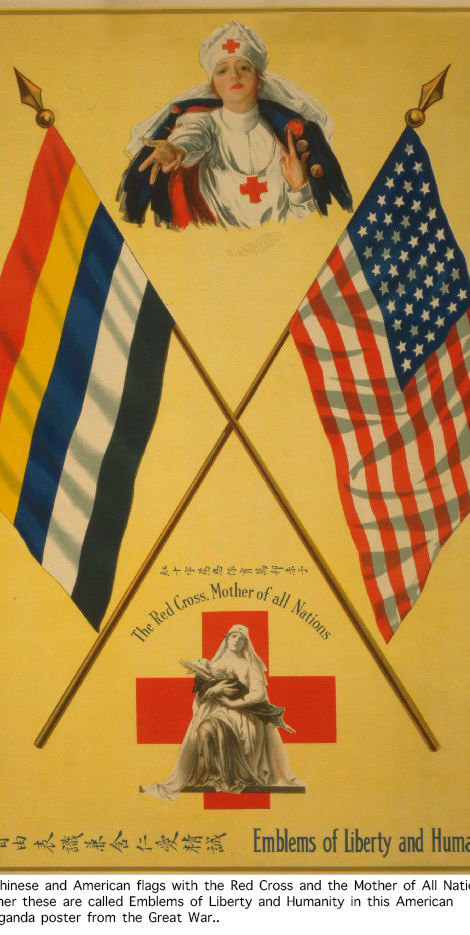
Centenary of the United States joining the war.
On 6th April, 1917, the United States declared war on Germany [sentence edited in response to comment below]. This turn of events will lead to China’s eventual declaration of war. How so? China had attempted to formally join the allies on several occasions. At the outbreak of the Great War the Chinese government offered military …
Report on members of the Chinese Labourer Corps hospitalised in Liverpool.
“The fact that none of them could speak English rendered the work somewhat difficult, an interpreter in the person of a Chinese corporal having to remain in the hospital during the whole of the time that any of the Chinese patients remained. As an example of the wonderful behaviour of these men and the manner …
Out of China by Professor Robert Bickers
Robert Bickers, who many will know from his excellent contribution to the Penguin (China) World War One Special Editions with Getting Stuck in For Shanghai: Putting the Kibosh on the Kaiser from the Bund: The British at Shanghai and the Great War, has written a new book, Out of China, officially published on 30 March: …
Corfflu Llafur Tsieineaidd | Two Videos in Welsh
Erbyn hanner ffordd trwy 1916, roedd y rhagolwg o’r cyngrheiriaid colli’r rhyfel yn dod yn bosibilrwydd wirioneddol. Roedd prinder gweithlu beirniadol wedi’I rhagfynegi wrth dilyn y colliad enfawr a ddaeth o’r Brwydr y Somme. Cafodd yr argyfwng hyn ei ddatrys gan y 96,000 o wirfoddolwyr Tsieineaidd a ffurfiodd y Corfflu Llafur Tsieineaidd a rhoddodd y …
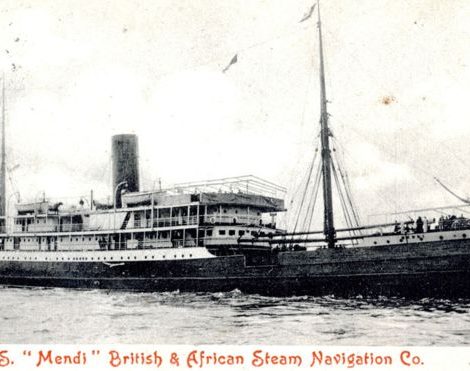
Reflections on SS Mendi Centenary Commemorations: A Chinese Perspective
Steve Lau, Chair of the Ensuring We Remember Campaign, offers personal reflections on an SS Mendi commemoration event. The SS Mendi was en route from South Africa to France. On board were over 800 member of the South African Native Labour Corps. At 5:00am on 21st February 1917 the SS Mendi was sailing past the …
SS Athos Centenary
Launched at precisely 12:27 on February 17th we mark the centenary down to the minute when tragedy struck the SS Athos. The Athos was a French vessel, and was carrying 100 passengers, 850 Senegalese Tirailleurs who boarded at Djibouti and 950 Chinese labourers who had been recruited by the French (Travailleurs Chinois) who boarded the Athos at Hong …
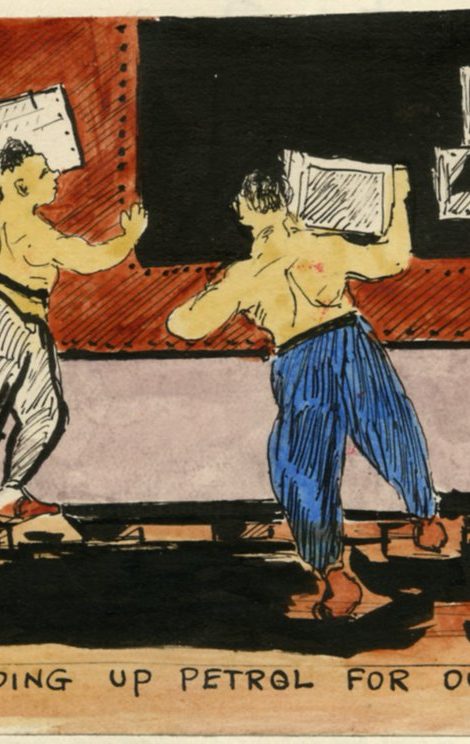
War Hellish War – the illustrated diaries of Jim Maultsaid
Barbara McClune is to be congratulated for getting Jim Maultsaid’s war diaries published. Although not a diary in the classical sense, with each entry dated, the entries are (or at least appear) to be in chronological order. What makes this book worth the five stars? That’s easy. In this book there is an intriguing, and …
Attitudes towards the Chinese after the Armistice
“The Chinese coolies in the pay of the English army, inspire real terror in the country they occupy (… ) many misdeeds are attributed to them, some even committed with weapons in hand. (We) urgently (ask) public authorities that the district of Péronne be freed and that they be shipped back to Asia. “ Chamber of Commerce …
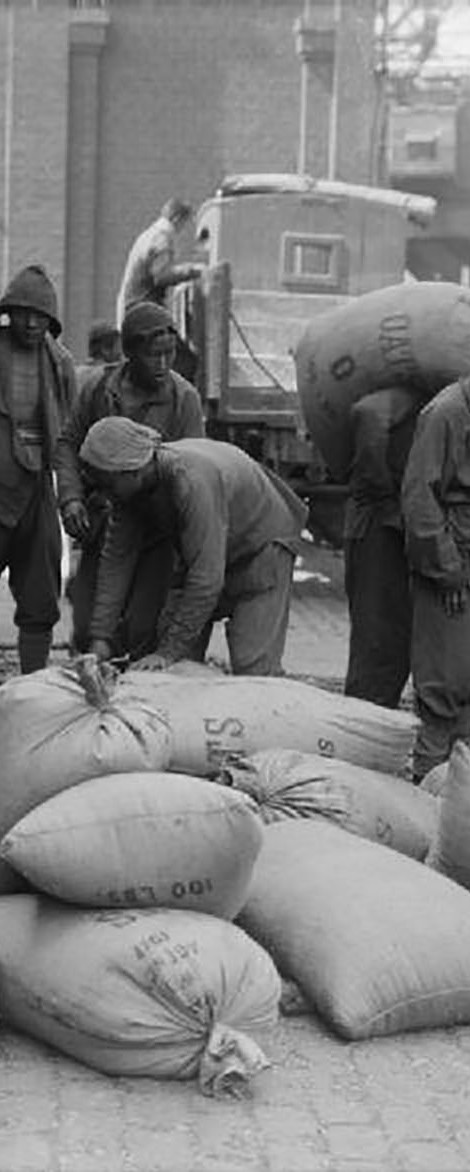
No In Memoriam
Today, 6th October, is the first day since the 13th August when we started to commemorate the anniversaries of deaths among the men of the Chinese Labour Corps, that that there are no men to remember. It is one of a handful of days in the year when no deaths occurred among the men of the Chinese Labour …
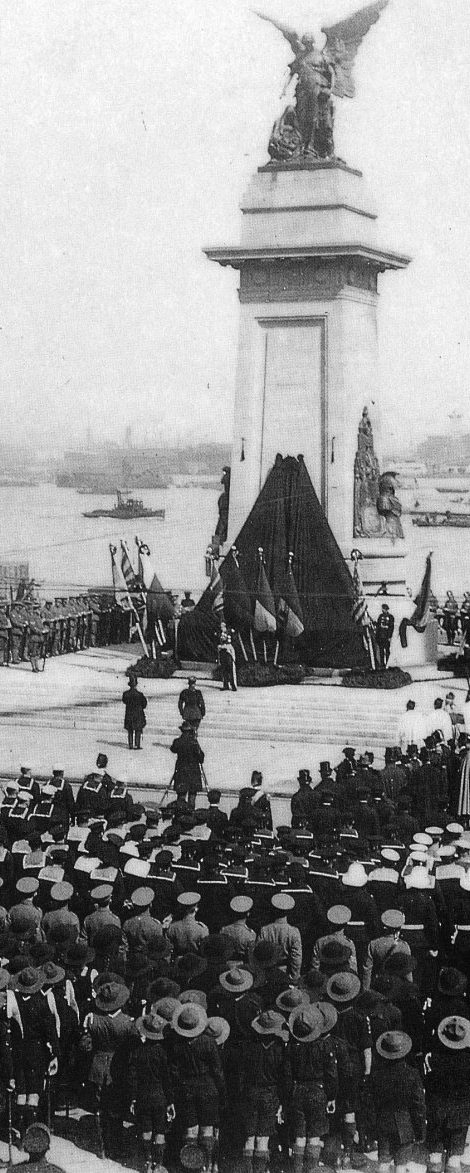
The Shanghai War Memorial
Photograph of the 1924 unveiling of the Shanghai War Memorial to the Great War. The memorial was built to commemorate around two hundred Shanghai expats (from the Allies) who died in the Great War. It is worth remembering, of course, that China joined the war on the allied side in late 1917. But this was only …
Burial Detail
For the men on burial detail, exhuming and burying their former comrades was an extremely difficult and traumatic task. Those who volunteered for the job were paid an extra 2s 6d per day (worth around £24.10 today). ‘For the first week or two I could scarcely endure the experiences we met with, but I gradually …
Countdown to China’s Great War centenary
Today’s our second anniversary. We launched the Ensuring We Remember Campaign on the 14th August 2014. It wasn’t a random date, it marked the 97th anniversary of China formally joining the allies as a belligerent in the Great War. From today, 14th August 2016 through to 13th August 2017 we will be remembering the men …
With the Chinese Labour Force in France in 1918
With the Chinese Labour Force in France in 1918 (The late Norman Mellor worked with the Chinese Labour Corps for some time after the war. In October 1999, a copy of his report was sent to me by his widow. Unfortunately the copy of the report – date stamped 29 Mar 1983 – is rather …
Chinese labour on the home front to be explored at Conference in September.
The Ensuring We Remember Campaign is delighted to be contributing to Dissenting Voices and the Everyday in the First World War Conference to be held at the National Archives over three days, starting on September 8, 2016. An outline of our presentation is given below. Trade Unionism and the Yellow Peril: The use of Chinese labour …
Jim Maultsaid sums up the Chinese
In the newly published second volume of Lieutenant Jim Maultsaid’s diaries he gives the following summary of his feelings towards the Chinese at the start of the section covering his command within the 169th Company of the Chinese Labour Corps. To my last day on this Earth I will always have a very high …
Did China’s wartime exports of wheat to the allies cause the North China Famine of 1920-21
For some time here at Campaign HQ we have puzzled over an article in the New York Times that appeared on the 5th June, 1921. The article is a plea by Union N Bethell, Chairman of the Executive Committee of the American Committee for China Famine Fund n which he claims a causal link between the thousands of tons …
“The European war made possible Japanese aggression on China.” An American’s view from 1916.
The European war made possible Japanese aggression on China. The War Party in Japan assured their compatriots that all Europe was engrossed in a life-and-death struggle; and no European nation would or could interfere with Japan’s realization of her ambitions; that the United States was isolated, and the protection of China would not furnish her …
On this day 1918, the British shut down their recruitment network in China. Following the entry of the United States into the war in April 1917 the US Army expanded rapidly. The need to transport this vast American force across the Atlantic Ocean to France put increasing pressure on the already stretched capacity of Allied …
Englands Yellow Peril – Sinophobia and the Great War
As England suffered heavy casualties at the front during World War One, the nation closed ranks against outsiders at home. England sought to reaffirm its racial dominance at the heart of the empire, and the Chinese in London became the principal scapegoat for anti-foreign sentiment. A combination of propaganda and popular culture, from the daily …
An interesting character: Dr. Tillson Lever Harrison
A serial bigamist, front-line physician in 7 wars, and humanitarian revered in China, Canada’s own Dr. Tillson Lever Harrison is a study in contradictions. In 1917, Harrison joined the Canadian Army, abandoned Eva, and served in France as a physician to the Chinese Labour Corps, which carried stretchers, dug trenches and delivered ammunition. Harrison …
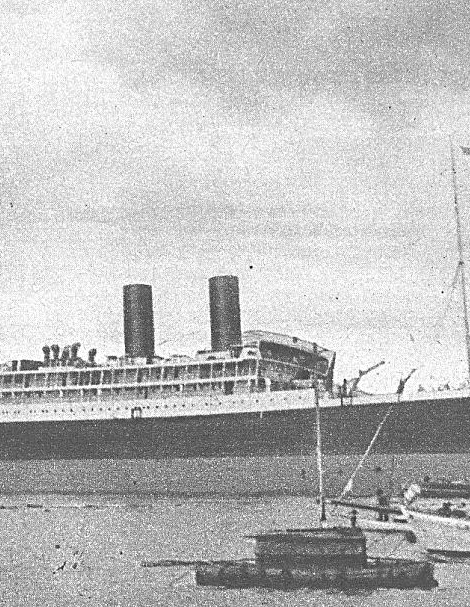
Remembering the 543 men of the SS Athos
It was on this day 1917 that a French registered ship, the SS Athos (pictured), was sunk by a German u-boat attack in the Mediterranean, tantalisingly close to their final port of call, Marseilles. 543 Chinese labourers recruited by the French lost their lives. At this point it was the practice of the French not …
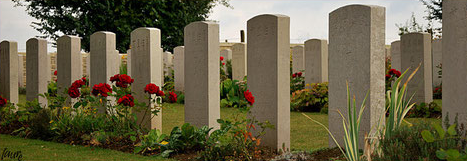
A tribute to the Commonwealth War Graves Commission
We owe so very much to the Commonwealth War Graves Commission (Commission) in relation to commemorating the fallen men of the Chinese Labour Corps (CLC), as a community, as a society and as a nation. For almost one hundred years the Commission carried the torch that ensured that the light that illuminated the CLC’s contribution was …
Forgotten Voices from The First World War: The Chinese Labour Corps
By Alex Calvo and Bao Qiaoni Global Research, December 26, 2015 The Asia-Pacific Journal, Vol. 13, Issue. 49, No. 1 21 December 2015
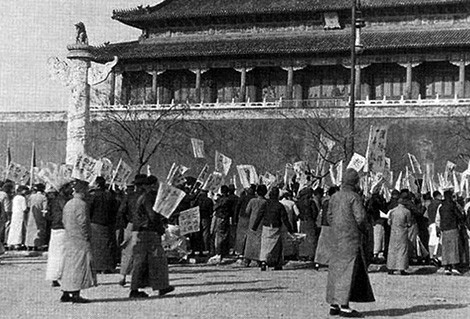
The editing out of the Chinese Labour Corps began before they had even all left Europe – at the Paris Peace Conference. The consequences were profound.
Photograph of May 4th demonstrators, Beijing, 1919 [T]he meaning of the Versailles settlement [is reconfigured] by exploring its unintended consequences in stimulating movements of national liberation in Egypt, India, Korea, and China. Instead of telling us about the interplay of Great Power politics, he shows how non-Europeans invented their own version of Wilson in their search for a kind of self-determination …
A contemporaneous report of a Chinese Labour Corps camp under bombardment.
[Date of incident referred to is Saturday 29th September, 1917.] We had been in our tents a couple of hours, when Fritz returned once more, and drop bombs in a camp of Chinese Labour Corps, killing a few and wounding many. Some of the Chinese had the fighting spirit, and shook their fists at the …
A description of the Chinese Labourers
It is the destiny of all Coolie Labour Battalions, once landed in France, to be divided into I don’t know how many parts, and disbursed over a wide area of usefulness…some are marching by the harvested fields of the Somme country on the way to chalk pits to dig ballast for light railways; others are in …
Stanley Cemetery, Hong Kong
Stanley Cemetery sits on the southern side of Hong Kong Island and is maintained by the Commonwealth War Graves Commission (CWGC). The cemetery is not particularly large, but is immaculately maintained, as anyone familiar with the work of the CWGC would expect. Its entrance is dominated by …
Praise… of sorts!
“During the last big push by Germans, the Chinese labourers working behind the lines offered their services to help the wounded, who were streaming back from the front in all kinds of conveyances. When official permission was given, they gave their own cigarettes and food rations to the wounded men they were helping. The wounded …
The Chinese Labour Corps in Basra? Part 2
In a recent post, The Chinese Labour Corps in Basra? we explored the story of 227 unidentified Chinese buried in Basra, explaining our belief that records had been lost rather than the names of those Chinese having never been recorded. Our belief was based as much on cultural reasons as on anything else. Wherever possible the British paid respect to …
Victory over Japan Day
Most people in the UK would probably not attach much significance to the 15th August. Elsewhere it is a day of national significance, not least of all in China, as it is the day on which the Imperial Japanese army surrendered, and the Second World War truly came to an end. As we approach the …
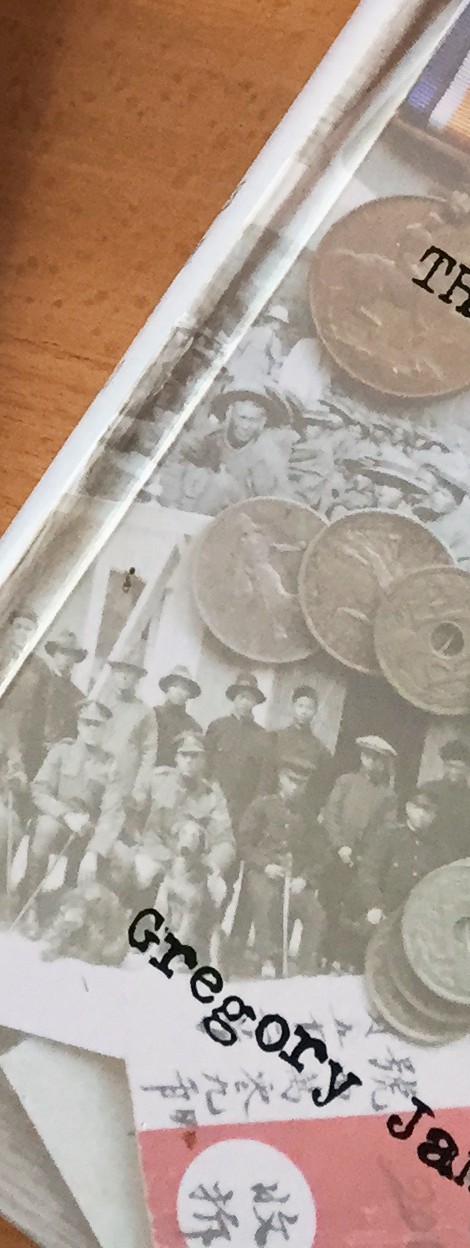
The Chinese Labour Corps (1916-1920), Gregory James
The Chinese Labour Corps (1916-1920) Gregory James Bayview Educational (2013) In this important and wide ranging contribution to military history, Gregory James draws on an extensive array of public and unofficial sources to chronicle the saga of a wartime cross-cultural encounter whose legacy remains in the narrative of contemporary Sino-Western relations today. For your copy contact: …
The affect of an air raid on Chinese Labourers, a contemporaneous account
To add to the drivers’ difficulties, numbers of Chinese ran screaming about the place, many of them crazy with fear. One girl was asked to keep a Chinaman in her car while the men went to fetch more patients, but though quite a little man, she had to invite a passing soldier to come and …
In memory of John “Jack” Johnstone
Private M1/5741 John “Jack” Johnstone, committed suicide on the 7th July 1916. Why it is hard to even guess a reason. Perhaps it was because of the date, he killed himself soon after the opening of the Battle of the Somme. Jack was only 21 he had his life in front of him. He was …
What should we remember?
An interesting question was posed in a report by Austrian researchers into commemoration. But what should we remember if existence and memory are no longer part of what we remember? It’s a great little sound-bite, but what does it mean? Ultimately, if we do not remember existence or memory, then what can we remember? Reflecting on the …
The difficulty of assessing China’s war loses
It is difficult to clearly evaluate China’s war losses during World War I (WWI). Firstly, defining the time period in question is a complex matter: China passed through a period of neutrality (August 1914 – March 1917), a period of severance of diplomatic relations (March 1917 – August 1917), and a period of declaration of …
2007 Article from the South China Morning Post
BEHIND THE NEWS Oct 08, 2007 A bronze plaque on the wall of a Paris railway building and a modest monument in a small park are the only reminders of a remarkable but forgotten story of the first world war – 150,000 Chinese volunteers who cleared mines, removed the dead and made munitions, and became …
Artistic License
https://youtu.be/as1436gxKvA This ten minute blockbuster treatment of the Chinese Labour Corps by the Hong Kong film industry will certainly raise a few eyebrows among historians as artistic license has been taken in abundance. Of course this is a commercial film and not an historic documentary; and commercial films are essentially produced to make money. Donnie …
Surely we should invite our Chinese friends to the Cenotaph
The following article, by Professor Michhael Wood, appeared in the April 2015 edition of BBC History Magazine. Our thanks to historyextra.com and the editorial team’s kind permission for us to reproduce the article. We’ve been filming in China on and off for many months now, and still enjoying every minute. It’s nearly 30 years since …
A contemporaneous report on the Chinese Labour Corps
WAR WORK OF CHINESE VOLUNTEER BATTALION. DUTY BEHIND THE LINES. ACCOUNT BY DR. STUCKEY. The fine work done behind the lines in France by the Chinese Voluntary Labour Battalion was described by Dr. E. J. Stuckey, O.B.E., of the Union Medical College, Pekin, in an interview yesterday. Dr. Stuckey, who is at present touring New Zealand …
The Long Shadow
[T]he Chinese dimension of the Great War rarely figures in British-centred narratives despite its importance in understanding our own day. David Reynolds The Long Shadow: The Great War and the Twentieth Century, p432 ISBN-13: 978-0857206350
英国殖民大臣专电英属威海卫租借地行政长官骆克哈特
值此停战大喜之日,我向威海卫人民祝贺战争胜利,并感谢你们的帮助,从威海卫招募的华工军团对战争发挥了巨大作用,非常感谢华人社团对政府的衷心支持。 1919年11月11日 青少年爱国主义网
The `coolie’ killing fields
By Danny Buckland in The Independent, 28 June, 1997 Britain has made much of human rights in the run-up to the hand- over of Hong Kong to the Chinese, but who are we to point fingers? As Danny Buckland reports, thousands of Chinese labourers died at our hands from mistreatment, malnutrition and bullets during the turmoil …
The Labour Auxilaries
The Great War revived, to a degree that few dream of, methods of very old campaigns, when the hero had his attendant myrmidons and the Spartan foot soldier his helots. Study a “ration strength” return of the B.E.F., France, 1918, and discover how the actual fighting men in trench or gun-pit had to be …
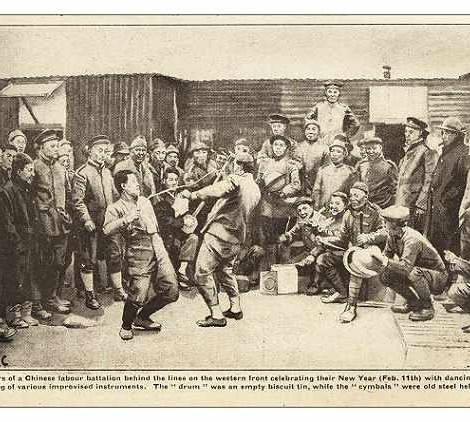
Celebrating Chinese New Year 1918 on an old biscuit tin
Members of the Chinese Labour Corps use an old biscuit tin for a drum and a pair of old helmets for cymbals to celebrate Chinese New Year on 11th February 1918.

Sinking of SS Athos with the loss of 543 Chinese lives
The SS Athos was a French merchant ship that was sunk by a German Submarine ( U-65 commanded by Hermann von Fischel) on 17th February 1917, 180 nautical miles off the coast of Malta. On board were about 1,000 Chinese labourers who had been recruited by the French, and had almost completed their journey to France, with …
Chinese sacrifice
“On the 7th September, 1918, the tanker “British Sovereign” caught fire in Calais west dock, strewing a sheet of flame across the surface of the water, into which leapt the Chinese crew or dockers to escape the inferno. Every one of these poor wretches was horribly badly burned, and some died before they could reach …
Une Immigration Oubiliée
An article in French by Philippe Divelier on Chinese labourers during the First World War.
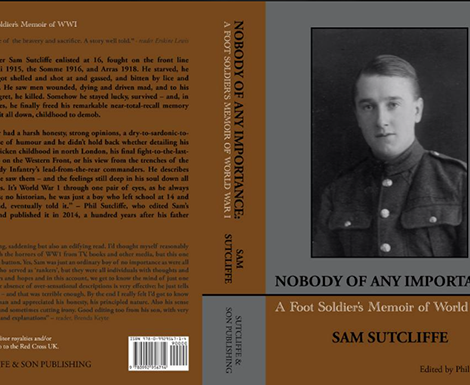
Nobody Of Any Importance: A Foot Soldier’s Memoir Of World War I
By kind permission of Phil Sutcliffe, an excerpt from Nobody Of Any Importance: A Foot Soldier’s Memoir Of World War I By Sam Sutcliffe Available from philsutcliffe47@gmail.com £10 + P&P. Website: www.footsoldiersam.co.uk Twitter: @FootSoldierSam A POW from March 28 (the battle near Arras) until Armistice, my father, starved and dysentery-wracked, walked back west from his POW …
About the Chinese Labour Corps
Every man who joined the Labour Corps was assigned a number that would effectively replace their name for the duration of their service. Whilst translators were on hand to explain orders to the men, British officers referred to each man by the numbered wristband each wore and it was reproduced on the headstones of those men …
China’s problems at the outbreak of war: No 1. Spheres of Influence
China, at the outbreak of war, was effectively controlled (in large part) by five greet powers, Britain, France, Russia, Germany and Japan, through what was known as spheres of influence. Within these spheres the respective nations held sway, and even the Chinese government could not enforce its own laws if push came to shove. …
Book Review: China and the Great War: China’s Pursuit of a New National Identity and Internationalization.
Xu Guoqi. China and the Great War: China’s Pursuit of a New National Identity and Internationalization. Cambridge Cambridge University Press, 2011 342 pp. £24.93 (Paperback), £68.55 (Hardback) ISBN 978-0521283236. Reviewed by Peter Worthing Department of History, Texas Christian University Beyond Betrayal: The Larger Picture of China and World War I Discussions of China and World …
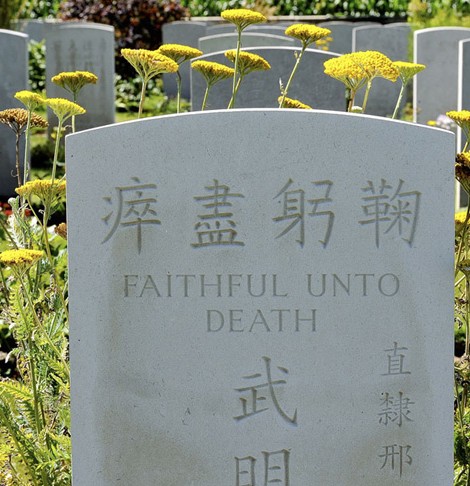
164 lives remembered in our first month
On the 14th August we began to remember the anniversaries of individual men of the Chinese Labour Corps who died in service. One month on we have commemorated 164 men.
Maintaining a balanced perspective
This letter appeared in The Guardian in response to Maev Kennedy’s coverage of our launch. Your account understated how horrendously these 95,000 Chinese were treated, as were 40,000 under French control. As Xu Guoqi revealed in his book Strangers on the Western Front: Chinese Workers in the Great War, members of the Chinese Labour Corps who survived …
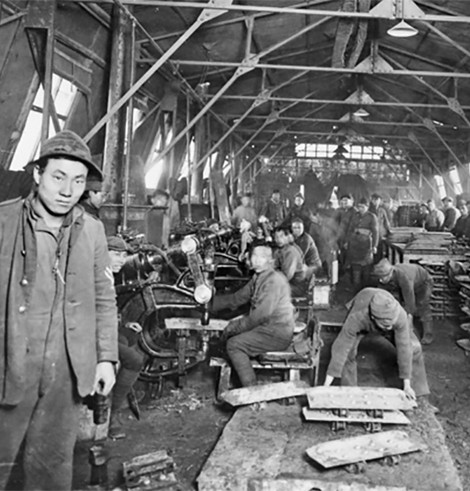
The Four Year War – 1916-1920
As our daily In Memoriam posts show, many Chinese Labour Corps men died well after the last guns had been fired, and the overwhelming majority of surviving combatant and non-combatant forces had returned home, mostly to be received as heroes. For the Chinese the four year war began not in 1914 to end in 1918, …
One week, 36 deaths – 23 after the Armistice
During our first week of remembering those members of the Chinese Labour Corps who died we have remembered 36 men. Of those 36, 23 died after the Armistice – that’s a staggering 64%. The most common surname of those who died was Liu (simplified 刘, traditional 劉)who accounted for 11% of the deaths -Liu is …
Protected: Observations on the Buckland article
There is no excerpt because this is a protected post.
Protected: Did China’s wartime exports of wheat to the allies cause the North China Famine of 1920-21
There is no excerpt because this is a protected post.
